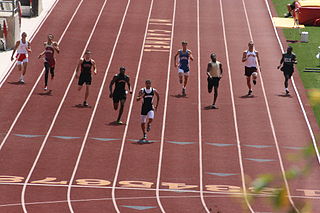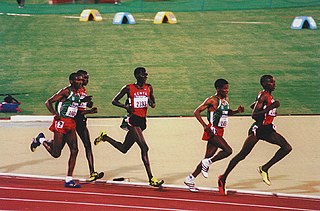
The javelin throw is a track and field event where the javelin, a spear about 2.5 m in length, is thrown as far as possible. The javelin thrower gains momentum by running within a predetermined area. Javelin throwing is an event of both the men's decathlon and the women's heptathlon.

The decathlon is a combined event in athletics consisting of ten track and field events. The word "decathlon" was formed, in analogy to the word "pentathlon", from Greek δέκα and ἄθλος. Events are held over two consecutive days and the winners are determined by the combined performance in all. Performance is judged on a points system in each event, not by the position achieved. The decathlon is contested mainly by male athletes, while female athletes typically compete in the heptathlon.
The World Athletics Championships are a biennial athletics competition organized by World Athletics. Alongside the Olympic Games, they represent the highest level championships of senior international outdoor athletics competition for track and field athletics globally, including marathon running and race walking. Separate World Championships are held by World Athletics for certain other outdoor events, including cross-country running and half-marathon, as well as indoor and age-group championships.
A heptathlon is a track and field combined events contest made up of seven events. The name derives from the Greek επτά and ἄθλος. A competitor in a heptathlon is referred to as a heptathlete.

The 400 metres hurdles is a track and field hurdling event. The event has been on the Olympic athletics programme since 1900 for men and since 1984 for women.

The 400 metres, or 400-meter dash, is a sprint event in track and field competitions. It has been featured in the athletics programme at the Summer Olympics since 1896 for men and since 1964 for women. On a standard outdoor running track, it is one lap around the track. Runners start in staggered positions and race in separate lanes for the entire course. In many countries, athletes previously competed in the 440-yard dash (402.336 m)—which is a quarter of a mile and was referred to as the 'quarter-mile'—instead of the 400 m (437.445 yards), though this distance is now obsolete.
The World Athletics Indoor Championships are a biennial indoor track and field competition served as the global championship for that version of the sport. Organised by the World Athletics, the competition was inaugurated as the World Indoor Games in 1985 in Paris, France and were subsequently renamed to IAAF World Indoor Championships in 1987. The current name was adapted with the name change of the sports governing body in 2019.

The European Athletics Championships is a biennial athletics event organised by the European Athletics Association and is recognised as the elite continental outdoor athletics championships for Europe.

60 metres, or 60-meter dash, is a sprint event in track and field. It is a championship event for indoor championships, normally dominated by the best outdoor 100 metres runners. At indoor events, the 60 metres is run on lanes set out in the middle of the 'field', as is the hurdles event over the same distance, thus avoiding some of the effects of the banked track encircling the venue, upon which other track events in indoor events are run. At outdoor venues it is a rare distance, at least for senior athletes. The format of the event is similar to other sprint distances. The sprinters follow three initial instructions: 'on your marks', instructing them to take up position in the starting blocks; 'set', instructing them to adopt a more efficient starting posture, which also isometrically preloads their muscles. This will enable them to start faster. The final instruction is the firing of the starter's pistol. Upon hearing this the sprinters stride forwards from the blocks.

The 1500 metres or 1,500-metre run is the foremost middle distance track event in athletics. The distance has been contested at the Summer Olympics since 1896 and the World Championships in Athletics since 1983. It is equivalent to 1.5 kilometers or approximately 15⁄16 miles. The event is closely associated with its slightly longer cousin, the mile race, from which it derives its nickname "the metric mile".

The 10,000 metres or the 10,000-metre run is a common long-distance track running event. The event is part of the athletics programme at the Olympic Games and the World Athletics Championships, and is common at championship-level events. The race consists of 25 laps around an Olympic-sized track. It is less commonly held at track and field meetings due to its duration. The 10,000-metre track race is usually distinguished from its road running counterpart, the 10K run, by referring to the distance in metres rather than kilometres.

The 5000 metres or 5000-metre run is a common long-distance running event in track and field, approximately equivalent to 3 miles 188 yards or 16,404 feet 2 inches. It is one of the track events in the Olympic Games and the World Championships in Athletics, run over 12+1⁄2 laps of a standard track. The same distance in road running is called a 5K run; referring to the distance in metres rather than kilometres serves to disambiguate the two events. The 5000 m has been present on the Olympic programme since 1912 for men and since 1996 for women. Prior to 1996, women had competed in an Olympic 3000 metres race since 1984. The 5000 m has been held at each of the World Championships in Athletics in men's competition and since 1995 in women's.
The World Athletics Race Walking Team Championships is a racewalking event organised by World Athletics. It has been held since 1961, and generally on a biennial basis. The first women's edition of the event happened in 1979. It was formerly known as the Lugano Cup after the city that hosted the first event, then became the IAAF World Race Walking Cup until 2016 and then IAAF World Race Walking Team Championships until 2018. In 2004, a junior division was added for athletes between 16 and 20. Since 2008 it has been a constituent meeting of the World Athletics Challenge – Race Walking.

The 3000 metres or 3000-metre run is a track running event, also commonly known as the "3K" or "3K run", where 7.5 laps are run around an outdoor 400 m track, or 15 laps around a 200 m indoor track.

Athletics at the 2020 Summer Olympics were held during the last ten days of the Games. They were due to be held from 31 July – 9 August 2020, at the Olympic Stadium in Tokyo, Japan. Due to the COVID-19 pandemic, the games were postponed to 2021, with the track and field events set for 30 July – 8 August. The sport of athletics at these Games was split into three distinct sets of events: track and field events, remaining in Tokyo, and road running events and racewalking events, moved to Sapporo. A total of 48 events were held, one more than in 2016, with the addition of a mixed relay event.

The 2022 World Athletics Championships was the eighteenth edition of the World Athletics Championships. It was held at Hayward Field in Eugene, Oregon, United States, from July 15–24, 2022, with the country hosting that competition for the first time. The competition was originally scheduled for August 6–15, 2021, but it was postponed by one year due to the COVID-19 pandemic.

The 2023 World Athletics Championships, the nineteenth edition of the World Athletics Championships, are scheduled to be held from 19 to 27 August 2023 at the National Athletics Centre, in Budapest, Hungary.
The 2025 World Athletics Championships will be the twentieth edition of the World Athletics Championships, and are scheduled to be held from 13 to 21 September 2025 in Tokyo, Japan. The championships will use the National Stadium, rebuilt for the Tokyo 2020 Olympic and Paralympic Games.

Athletics at the 2024 Summer Olympics in Paris are scheduled to run over a ten-day period at four different venues from 1 to 11 August 2024, featuring a total of 48 medal events across three distinct sets: track and field, road running, and racewalking.













